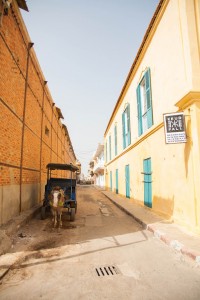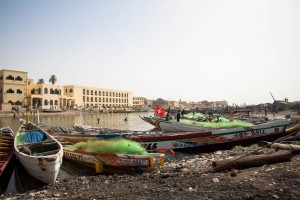
The tall man was right. We never really stopped to look around N’Gor village. I had just passed though their neighborhood without a cursory glance for the last three weeks. A quick look? I was just over here for a quick moment to meet James, the security head from IAMGOLD who had given us our security briefing a few weeks earlier and picked up some of our equipment for safe keeping. Still, did I have five minutes? Yes? Probably not… curiosity and guilt drove me forward.
Samba, my new friend, took me past the brightly colored pirogues on the beach.
“The wife, the wife chooses the color of the boat. It’s her boat. He gives it to her when they marry.”

Each hull shares a black and white design and a mixture of green, blue, red and yellow with one of these the predominant color of the boat.
“We get 60% of our money from fishing still, 40% from tourism…”
The pirogues are anywhere from canoe-sized to almost sixty feet, still of the same shape, a long prow. Its an old design and I could imagine the only modification in the last 100 years is a stronger transom for the outboard motors that power them.
“It’s a co-op. You bring your catch to the village first. If your engine is broken we will make sure it works.”
The village comes right up to the high tide line and is built mostly of concrete, the predominant building material we have seen so far in Dakar. At one point N’Gor was probably quite isolated from Dakar, but as both places sprawled, the physical boundaries between the two have blurred to anyone having a first glance. We walked past three old men, well dressed in traditional clothes, sitting next to the beach in the shade, grinning and laughing. Samba introduced the middle one, wearing all white, as the chief.
I shook hands with the three of them as they continued their laughter.
We took a left into a small side street no more than five feet across. To our right was a large long shed with open windows and a locked door. Three or four craft over sixty feet long and no wider than than a yard were packed close together. The bright colors and markings were the same as the fishing boats.
“Racing pirogues?” I inquired.
“Yes,” he replied. “Thirty men in each boat and one drummer.”
“When do you race them?” I asked hopefully.
“April and Ramadan.”
I gazed back at the familiar lines of the long skinny boats. Samba had moved on down the street. A right past a one-room Arabic school with thirty or forty boys and girls of three or four in uniform, neatly separated on the left and right.
“You must see the baobab tree. Its old. Six hundred years.”
Streets narrowed until they were only shoulder width apart. At a strange intersection was the baobab. Concrete walls built at odd angles to protect it within the confines of the village buildings.
“Solders from our village in World War I and II would come to pray, and they came back. In America and Europe you have technology, but here in Africa we have spirit.”
Samba pulled a twig from the baobab, folded it and handed it to me.
“You make three wishes: Two for yourself and one for another.”
I looked at it skeptically and then remembered my policy of always taking wish making seriously. Imitating Samba’s gesture I threw it at the trunk and on we went, deeper into the village.
“This is the talking tree,” He declared.
There was no tree – at least not anymore. We were in a small sandy courtyard next to the mosque.
“We have no police. If you do something bad, you answer to the village.”
From what little I read the village is family, friends, health care, welfare, and social security all wrapped into one. Alienating one’s self through bad behavior could be devastating.
“The chief sits here.”
Samba gestured to the shaded area.
“And he is helped by twenty elders.”
He gestured to a twenty by thirty foot half-enclosed area like a somewhat elegant standing jury box. The “talking tree” was quiet for now. I wondered what a case looked like in full swing. I doubted I would get the same enthusiastic invite to observe the village’s inner drama.
Just east and built into the complex was the mosque. Green and gold carpet and trim was perfectly clean.
“Over there is where we perform our ablutions before prayer. You cannot enter the mosque with shoes or without long pants.”
Samba pointed to a nondescript building across the street. I gazed into the mosque. It was spotless. Not a grain of sand, which even as a novice here in sub Saharan Africa, I can say with conviction is quite a miracle. If not divine cleaning, then certainly divinely inspired discipline.
“This is where the men pray,” Samba pointed back to the resplendent mosque, “and the women pray over there.”
Between the mosque was the courtyard in which we stood, and behind it a small unadorned room. I wondered how the local women felt about this.
Through the courtyard the village opened up to a large open plot of the light tan Sahel sand. Low walls make it visible but there was no obvious entrance. Five or six medium-sized baobabs grew around the plot and there was not a single visible piece of litter–not even a foot print. Over a hundred mounds were packed close together.
“This is our cemetery. We have no stones. It does not matter if you are rich or poor; everyone here is the same.”
Men, women, the chief and pauper – each identically sized mound seemed very small for a human.
“When you come to pray for your family you must pray for everyone else.”
The moment of silence was broken. A young man came up to Samba and asked something that irritated him. He waved him off and we progressed. I shook back into reality. I was over here to pick up the electronics from James. My fear of being rude to Samba had morphed to being rude in being late for James. I couldn’t be more than 200 yards away through the windy small streets.
“Samba, I must meet my friend.”
“Yes, I will take you. Will you buy rice for the school? “
Yes, a school! We had found our way into three schools in Dakar so far, but it seemed perfect to visit a school in the village across from our island now we have a connection… Wait. What?
“Yes you will visit the school and you will buy some rice for the children,” repeated Samba.
I must have sucker printed on my forehead. My inner monologue began: ‘Was any of this true? What kind of magic is this? That beautiful cemetery… of course that was real. The baobab, was that just for idiots picked off the beach? So that’s what the chief was laughing at… But this is rice for kids. How often have you spent ten bucks on a drink? Can you have any assurance that this will actually go to those kids? I know. Even if half of it was true it was a great story….Whats that worth? You’re getting cheated. I have so much. What if you let everyone do that to you… I never would have seen that. You’re too trusting…. I know… I don’t know if I want to stop…’
My cell phone rang breaking the inner monologue.
“Where are you? James is waiting,” said Markus.
“I’m two minutes away.”
“Where you go?”
“I’m not sure, I’ll tell you when I get back.”
He laughed. I could see him shaking his head.
I exited the village from an alley I had not previously seen. James was waiting patiently in the main parking area off the beach. He’s around my age, late twenty’s to early thirty’s. His scruffy beard and slightly grown out hair make him seem like ex-military… which he is… and no doubt a lot more savvy than I am. He doesn’t seem that irritated and I feel a bit embarrassed. We exchange Christmas plans and he reiterates that he is here to help. I thank him. We shake hands and part ways.
Samba’s waiting… also patiently. If I buy them rice I’m no doubt giving the money to one of his friends or family. I have no guarantee if a grain would get to a kid. But the whole village is connected. I walked past two schools with studying and playing children. Obviously they care about their kids. Will this actual allotment make it there? How far could it circulate in the village before it turned into rice for the kids. How many people in North America were paying it forward buying $5 lattes? Is that even a fair comparison?
I decided to buy the rice.
